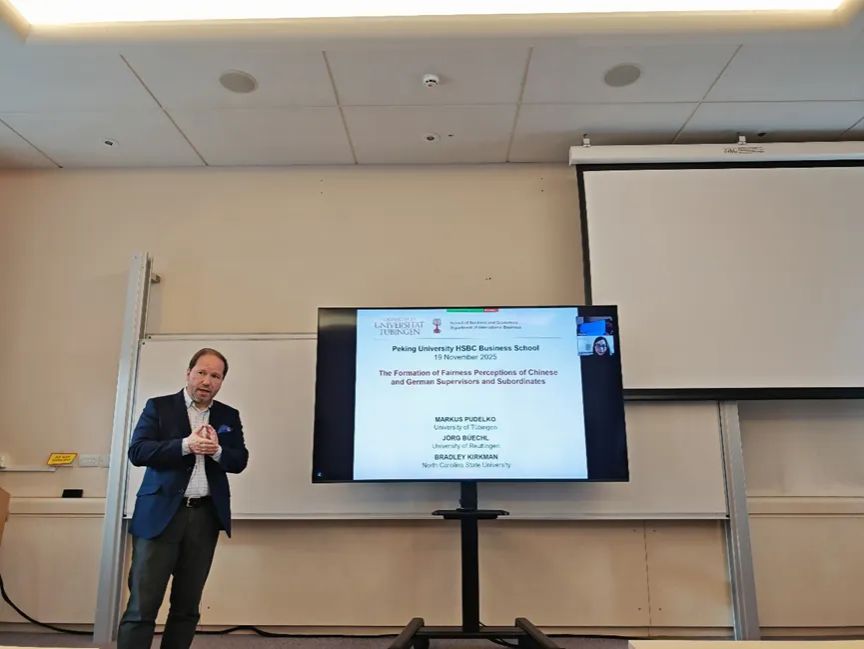On November 19, 2025, the Peking University HSBC Business School UK Campus (PHBS-UK) hosted a compelling session of its Seminar Series, featuring Professor Markus Pudelko from the University of Tübingen. Held in the Conference Room and moderated by Professor Stephan Gerschewski, the seminar, titled "The Formation of Fairness Perceptions of Chinese and German Supervisors and Subordinates,” focused on the complex dynamics between Chinese and German supervisors and subordinates.
Speaker Profile

Professor Markus Pudelko is Director of the Department of International Business at Tübingen University School of Business and Economics. He earned Master degrees in Business Studies (University of Cologne), Economics (Sorbonne University) and International Management (Community of European Management Schools - CEMS) and a PhD (University of Cologne). Currently, he is senior editor of the Journal of World Business and on the editorial board of more than ten other journals.

Professor Pudelko began by situating his co-authored work within the broader field of organizational justice, which studies how employees perceive fairness regarding decision-making and resource allocation. He distinguished between two traditional paradigms: The Event-Based Paradigm, focusing on fairness judgments regarding specific incidents (e.g., salary increases), and the Social Entity-Based Paradigm, involving holistic judgments of fairness regarding a supervisor or the organization. Pudelko noted that while existing studies are often confined to Western domestic contexts or static comparisons of mono-cultural settings, his research directly investigates the dynamic formation of fairness perceptions in the intercultural reality of modern workplaces.
Central to the presentation was the Cultural Identity Negotiation Theory. Professor Pudelko explained that cultural identity is not a static trait but is continuously constructed and reshaped through social interaction. In the context of Chinese-German work relations, supervisors and subordinates often encounter differing expectations of fairness. These encounters trigger an iterative process of reassessment and negotiation, where individuals must reconcile their cultural norms with the reality of their counterparts' behavior.
The insights presented were drawn from an extensive, inductive qualitative study. The research involved 130 interviews conducted in German, Mandarin, and English, spanning 25 German companies across various industries. This resulted in a massive dataset comprising 145 hours of recordings and over 2,100 pages of transcripts. The study captured perspectives from Chinese subordinates with German supervisors, German subordinates with Chinese supervisors, and their reciprocal supervisory counterparts.
The study identified that the path to developing shared fairness perceptions is moderated by five key factors: cultural preservation, knowledge of the counterpart's culture, transparent communication, cultural discrimination and intercultural sensitivity. A key insight shared by Professor Pudelko was that the negotiation process often leads to a reassessment of one's own fairness perceptions, shifting toward the other party's views. For instance, he explained that some Chinese employees reported becoming more egalitarian and less influenced by guanxi, while some German employees began to appreciate more caring and supportive leadership styles.

Professor Pudelko concluded by outlining the study's theoretical contributions, noting it is the first to introduce cultural identity negotiation theory to organizational justice research. On a practical level, he emphasized that international organizations must actively manage these negotiation processes. He advocated for enhanced cross-cultural training, the promotion of transparent communication, and a strong institutional stance against cultural discrimination.
This seminar offered an in-depth exploration of how fairness perceptions emerge through cultural identity negotiation between Chinese and German employees. Through qualitative evidence and a clear theoretical model, Professor Markus Pudelko provided valuable insights for understanding and improving cross-cultural work relationships.
By Zhou Zihan
Edited by Han Bing and Stephan Gerschweski
Photograph:Han Bing and Zhou Zihan